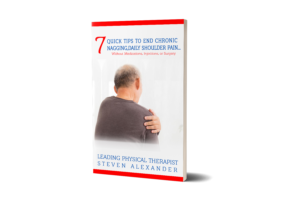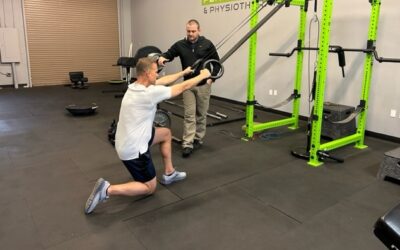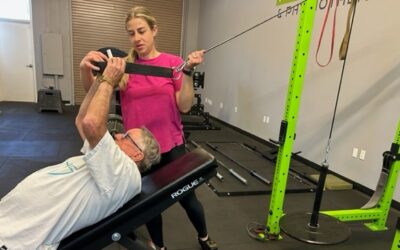You have been dealing with shoulder pain for weeks, months, and even years. By now, you have talked to your friends and family and you have diagnosed yourself with a rotator cuff tear.
Now what?
Or, worse, you have gone to get imaging done for your shoulder pain and it came back with a diagnosis you did not want to hear: Rotator Cuff Tear.
When you hear something is torn, I know you automatically think you need to get it fixed.
You have a tear in your pants, time to sew it up or get a new pair.
Is that old-school way of thinking still accepted? If you have a tear in your rotator cuff, do you really need to have surgery?
Before we take a deep dive into whether you need to schedule surgery, let’s discuss the rotator cuff.
The rotator cuff is a group of 4 muscles that wraps from the shoulder blade around the shoulder. These muscles have an important job to help the shoulder to move. After all, the shoulder is the most mobile joint in your body. It also helps stabilize the shoulder.
How do you know if you have a rotator cuff tear?
The Gold Standard is to have an MRI to diagnose a rotator cuff tear
Is that the only way to diagnose a rotator cuff tear?
Well, yes and no. There are other things we can look at to increase your likelihood of discovering if you have a rotator cuff tear, but nothing definitive. But, more importantly, a thorough subjective and objective measurement by a skilled Physical Therapist can determine where your source of pain is coming from.
If you are not in the healthcare field, this may surprise you. But, It’s been shown that identifying a rotator cuff tear on an MRI does not determine that you’ll be suffering and in pain.
In other words, it is very common for people to have rotator cuff tears that are asymptomatic. Meaning they have no pain or limitations in function and may not even be aware that they have a rotator cuff tear.
Common Questions From Patients:
“If it’s torn, won’t I need surgery?”
Not necessarily. There is strong research supporting that a full recovery is possible with physical therapy even when a rotator cuff tear is present. Don’t misunderstand what was just said. It is a full recovery that is possible. Recovery in terms of gaining strength, motion, and decreasing pain.
THIS DOES NOT MEAN THAT THE ROTATOR CUFF WILL ‘HEAL’
If the rotator cuff won’t ‘heal’ on an image, but recovery is possible, this shows that the rotator cuff may not be the source of the pain!
“But I have a massive tear, so I must need surgery.”
The size of the tear doesn’t always determine the amount of pain. We’d think that a larger tear means more pain, but that’s not true.
I’ve had patients bring in their MRI results showing a massive tear and they report minimal pain and can still lift their arm overhead and perform their daily activities with minimal pain.
On the other hand, I’ve had patients show up with negative X-Ray and negative MRI results who are in large amounts of pain with no explanation of why they’re suffering.
Remember, pain is different for all of us. How we experience it can be very different!
“So if I have a rotator cuff tear, how can I get back to normal without surgery?”
Let’s look at it this way. If you have pain or have trouble reaching your arms overhead, you probably aren’t functioning very well.
You’re probably having trouble reaching in the higher cabinets at home or maybe you’re having trouble washing your hair or getting dressed. Because of the pain you’re experiencing, you probably don’t have a very good range of motion or strength.
Research supports this claim as it shows that asymptomatic rotator cuff tears tend to become symptomatic over time attributed to decreased function, strength, and range of motion
This helps explain the idea that the tear may have been present before the pain even began and if the tear was there before the pain started that means that we can eliminate the pain without fixing the tear.
One study found that 23% of subjects had a rotator cuff tear without symptoms. [Tempelhof et al.]
- Subjects with asymptomatic rotator cuff tears
- 13% in people aged 50-59
- 20% of people aged 60-69
- 31% of people aged 70-79
- 51% of people aged 80+
The truth about rotator cuff surgery…
- It’s a long recovery (4-6 months, maybe even up to 9 months if you enjoy high level activities such as swimming, playing golf or tennis.)
- It’s painful.
- Typically you’re stuck in a sling for the initial 4-6 weeks following surgery.
- Even after undergoing surgery, it’s a slow process to start moving and using your arm again.
- One study found that approximately 25% of rotator cuff tears failed to remain intact (post-operatively) AND improvements in function were less than 75% of possible improvement
Pain is extremely complex. Working with a therapist to determine your limitations in function and causes of pain can help individualize your care and allow you to return to the activities you love.
Now everything is patient dependent, but I myself have rehabilitated many people with large, even massive, rotator cuff tears and they have returned to sport and daily activities without shoulder pain.
I once had an orthopedic surgeon tell me “If you want a reason to have surgery on someone, order an MRI.”
So before you end up spending a ton of money on imaging, cortisone injections, and possibly signing up for surgery. Give us a call.
An assessment with a PT can help determine if your rotator cuff is causing your pain and what the best treatment options are going forward.
Looking for another way to help with the pain?
Get your free copy of our shoulder pain report written by our founder, Dr. Steven Alexander which explains:
How to ease the annoying, nagging, irritating shoulder pain naturally before it gets any worse…
Click here to download the free SHOULDER PAIN REPORT
If you’ve been suffering with shoulder pain for weeks, or even months, and things are getting worse – it probably is not going to fix itself is it?
We have worked with hundreds of patients with shoulder problems who can’t pick up their normal weights at the gym, struggle to drive without pain, and get agonizing aches when they’re doing jobs around the house.
Now, those patients can move freely, don’t need to rely on painkillers and can easily do their day-to-day activities.
In this FREE consultation, you will get expert advice about the worry and frustration of your life-changing aches and pains – for FREE, in under 29 minutes.
To discover how you can FINALLY fix your shoulder problems…
Arrange a free consultation by calling us on 480-452-9191 or by clicking the link below:
Click Here To Arrange Your FREE CONSULTATION
Articles
- https://www.ncbi.nlm.nih.gov/pmc/articles/PMC7026731/





